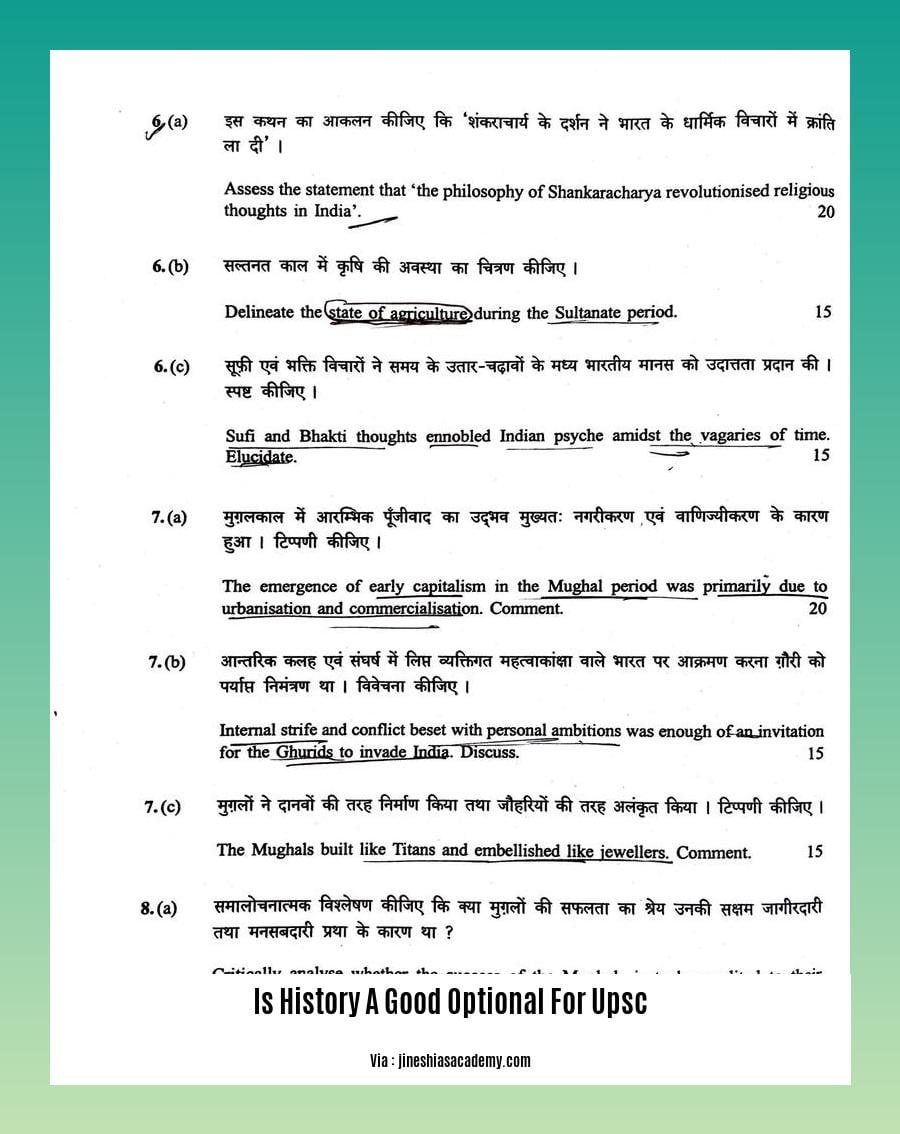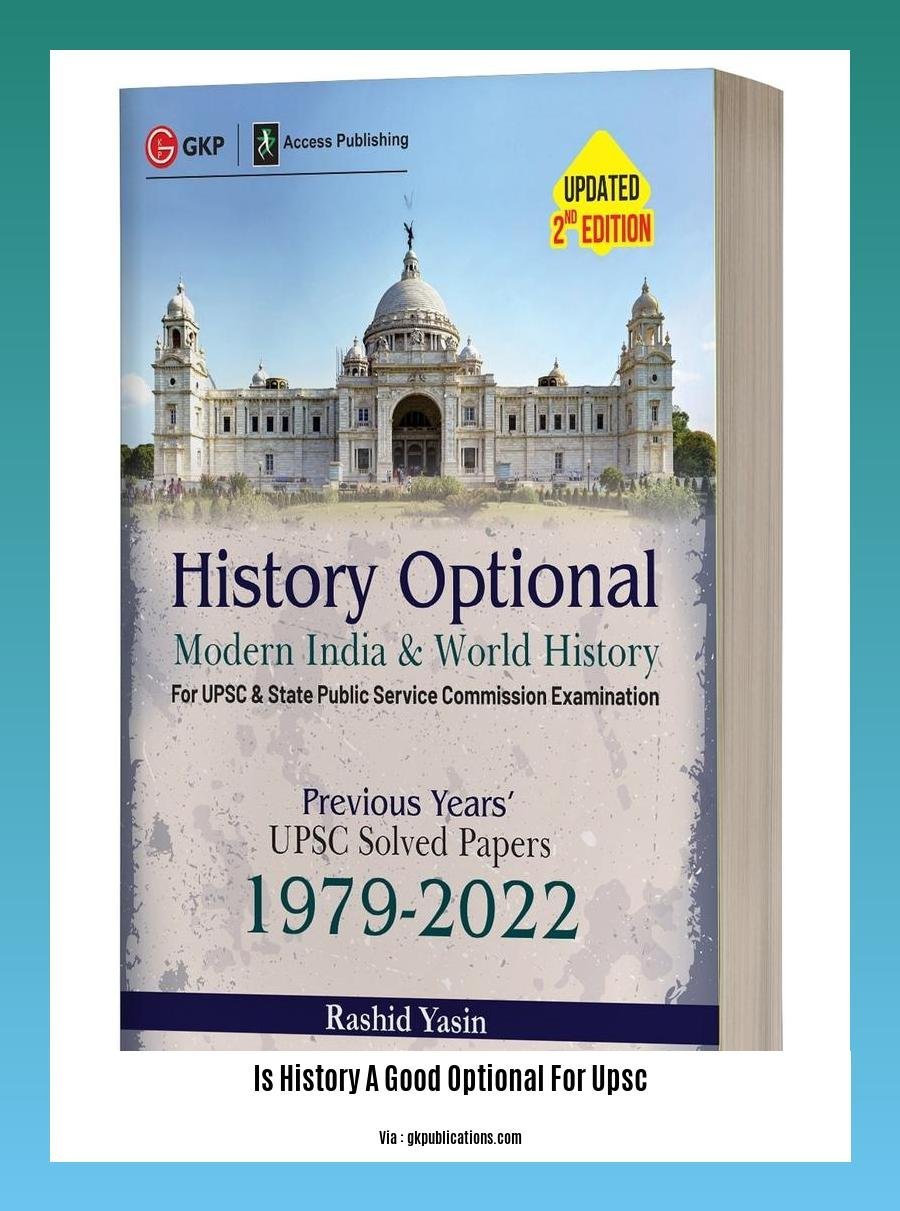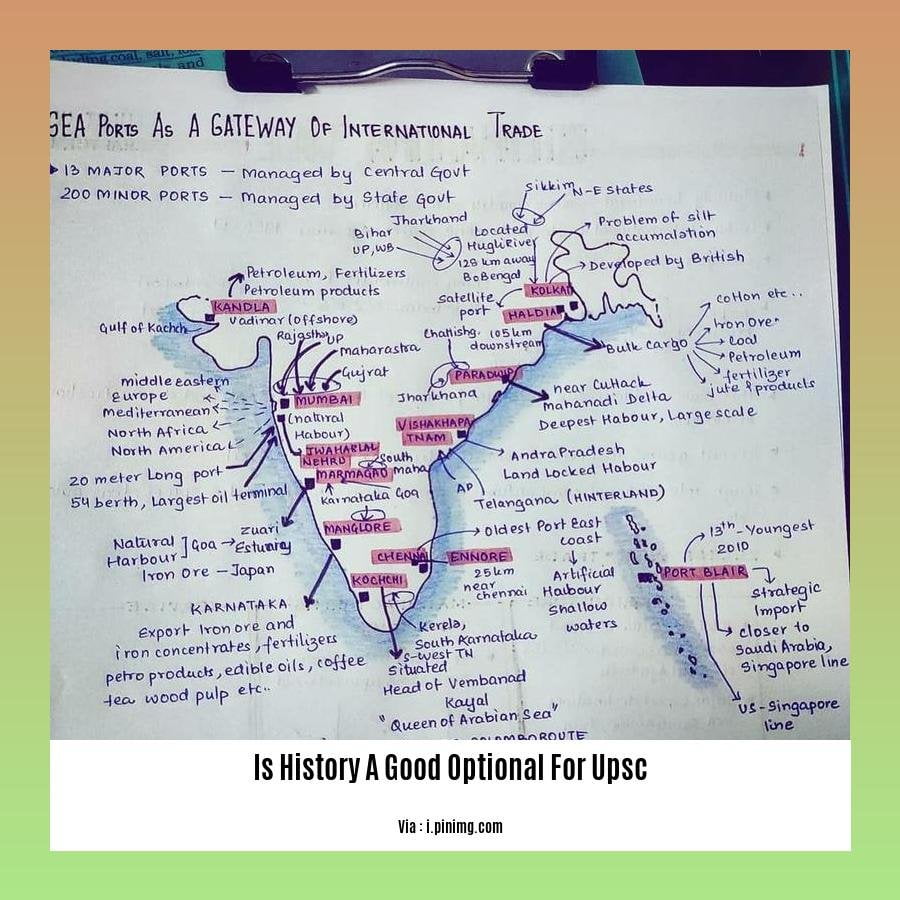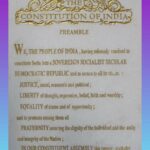Is History a Good Optional for UPSC: Exploring Its Significance and Advantages? With the UPSC examination holding immense significance in the Indian civil services landscape, choosing the right optional subject can be a pivotal decision. Among the diverse options available, history stands out as a compelling choice for aspirants seeking a comprehensive understanding of the nation’s past and its profound impact on governance. In this article, we delve into the significance of history as an optional subject, exploring its advantages and suitability for aspirants aiming for excellence in the UPSC examination.
Key Takeaways:
History is an optional subject in UPSC Civil Services Mains Exam that covers Ancient, Medieval, Modern and World History, thus, has a great overlap with the General Studies Paper 1 syllabus.
UPSC History optional covers topics like historiography, sources and techniques used in the study of history, and chronological events.
Choosing history as an optional offers advantages such as:
- Topic overlap with GS Paper 1, allowing efficient preparation for both papers together.
Is History a Good Optional for UPSC: Exploring Its Significance and Advantages

Choosing an optional subject for the UPSC Civil Services Mains exam is a crucial decision that can impact your chances of success. If you’re considering History, you’ll find it to be a rewarding choice with numerous advantages.
Overlaps with General Studies Paper 1
History overlaps significantly with the General Studies Paper 1 syllabus. This common ground makes it easier to prepare for both papers simultaneously, as many topics are covered in both.
Develops Analytical Thinking and Problem-Solving Skills
Studying history trains your mind to analyze historical events, understand different perspectives, and draw connections between the past and the present. These analytical and problem-solving skills are invaluable in various aspects of civil service, including policymaking, administration, and public service.
Inculcates a Multidisciplinary Perspective
History is a multidisciplinary subject that draws on various fields such as economics, politics, sociology, and culture. By studying history, you’ll gain a comprehensive understanding of the interconnectedness of different disciplines, which is essential for effective governance in a complex world.
Enhances Writing and Communication Skills
History writing involves organizing and presenting information in a clear and concise manner. This practice improves your writing and communication skills, which are crucial for effectively conveying your ideas and recommendations as a civil servant.
Provides a Foundation for Understanding Contemporary Issues
History offers a lens through which we can understand the roots of contemporary issues and challenges. By studying historical precedents, you’ll gain insights into how past events have shaped present-day societies and policies, enabling you to make informed decisions as a civil servant.
High Success Rate
History has a relatively high success rate among optional subjects in the UPSC Mains exam. This is likely due to the combination of factors mentioned above, such as its overlap with GS Paper 1, its focus on analytical and problem-solving skills, and its multidisciplinary nature.
Ultimately, the decision to choose history as an optional subject should be based on your interests, strengths, and career aspirations. If you have a passion for history and see yourself working in a field where a deep understanding of the past is valuable, then history could be an excellent optional choice for you.
Remember, while history is an enriching and rewarding subject, it also requires dedication, hard work, and a genuine interest in the field. If you’re willing to put in the effort, choosing history as your optional subject can open up a world of opportunities and help you excel in the UPSC Civil Services exam.
Crave to master the art of yoga? Unravel the rich history of yoga, from its ancient origins to modern-day practices! history of yoga in short
Intrigued by the evolution of yoga over time? Delve into our history of yoga timeline to explore important milestones and the remarkable individuals who shaped this practice.
Journey through time and explore the world’s history in a captivating way with our interactive timeline of world history that brings the past to life!
Examining the relevance of historical knowledge in the context of contemporary governance and policymaking

History is a subject that is not just about the past-it is about the present and the future as well. The decisions we make today, whether in governance or policymaking, are shaped by our understanding of what has come before us. History provides invaluable knowledge and a conceptual toolkit for addressing contemporary policy issues; let’s explore why.
History offers instructive parallels:
History is replete with examples of success and failure. By studying past decisions and their consequences, contemporary policymakers can draw instructive parallels and make more informed choices. Whether it’s analyzing economic development strategies or devising social welfare programs, a deep understanding of history helps policymakers appreciate the long-term implications of their decisions.
History helps avoid past mistakes:
History is a treasure trove of lessons learned. Policymakers can prevent repeating past mistakes by studying them. Whether it’s avoiding disastrous economic policies or learning from diplomatic blunders, a knowledge of history equips policymakers with the insights necessary to navigate complex challenges effectively.
History fosters nuanced policymaking:
History provides a depth of understanding that goes beyond superficial analysis. By delving into historical context, policymakers gain a nuanced appreciation of issues, considering various perspectives and factors that shape them. This fosters a more comprehensive and holistic approach to policymaking, leading to more effective and sustainable solutions.
Key Takeaways:
History offers a rich repository of knowledge and experience: History has documented the successes and failures of various policies, governance systems, and strategies throughout time. This vast repository of knowledge provides valuable insights for contemporary policymakers.
History helps policymakers understand the long-term implications of their decisions: History demonstrates how past decisions have shaped current events and outcomes. This understanding enables policymakers to anticipate the potential long-term consequences of their own decisions, allowing them to make more informed choices.
History helps policymakers avoid repeating past mistakes: By studying the failures of the past, policymakers can identify patterns and mistakes to avoid. This knowledge helps them to make more effective decisions and avoid repeating the same errors that have occurred in the past.
History fosters a more nuanced and informed policymaking process: History provides policymakers with a deeper understanding of the historical, cultural, and political context of contemporary issues. This knowledge helps them to make more nuanced and informed decisions that are tailored to the specific needs and circumstances of their countries or organizations.
Relevant Sources:
The Value of History in Policymaking
Governance and Growth: History, Ideology, and Methods of Proof
Highlighting the Importance of Historical Understanding for Effective Administration and Decision-Making
Do you ever wonder how decisions are made in the hallways of power? How do leaders navigate complex issues, sift through vast amounts of information, and make choices that affect the lives of millions? The answer lies in the ability to see beyond the present and into the past—to understand how history shapes our present and informs our future.
A Historical Perspective: The Foundation for Sound Decision-Making
Imagine a doctor diagnosing a patient without knowing their medical history. It would be akin to policymakers making decisions without understanding the historical context of the issues they face. History, like a roadmap, provides the context and insights necessary for effective administration and decision-making.
Take, for example, the debate on climate change. To grasp the urgency of the situation, policymakers must delve into the history of industrialization, the greenhouse effect, and past attempts to mitigate global warming. This historical understanding helps them make informed decisions on emission reduction targets and sustainable development strategies.
Historical Precedents: Learning from Past Mistakes
History is not just about memorizing dates and events; it’s about learning from past mistakes and successes. By studying historical case studies, policymakers can identify patterns, anticipate potential pitfalls, and emulate successful strategies.
In the realm of economic policy, for instance, understanding the historical context of past financial crises, such as the Great Depression or the 2008 financial crisis, can help policymakers develop more resilient economic systems. They can learn from the mistakes made, the policies that failed, and the lessons that can be applied to prevent future crises.
Avoiding Unintended Consequences: Foresight Through Hindsight
History can help policymakers avoid unintended consequences by providing them with a broader perspective and foresight. It allows them to anticipate the ripple effects of their decisions, consider alternative scenarios, and mitigate potential negative outcomes.
In urban planning, for example, understanding the historical evolution of a city’s infrastructure, zoning laws, and transportation systems can help planners make informed decisions that avoid traffic congestion, pollution, and other urban challenges.
Key Takeaways:
History provides a critical lens to analyze and understand complex issues, ensuring more informed decision-making.
Historical insights help policymakers identify patterns, learn from past mistakes, and emulate successful strategies.
Understanding historical precedents allows policymakers to anticipate unintended consequences, mitigate risks, and make more resilient decisions.
History fosters a broader perspective, enabling policymakers to consider alternative scenarios and make choices that are mindful of long-term implications.
Sources:
[1] The Value of History in Policymaking – Institute for Government
[2] Governance and Growth: History, Ideology, and Methods of Proof – Oxford Academic
Providing insights into the role of history in shaping social, political, and economic systems
“History isn’t just a collection of dates and events. It’s the story of how we got here. It’s the foundation upon which our present is built and the key to understanding our future.
History shapes our social systems:
Our social norms, values, and institutions are all products of our history. The way we interact with each other, the way we raise our families, and the way we govern ourselves are all influenced by the past. For example, the caste system in India is a product of its history of colonialism and feudalism.
History shapes our political systems:
Our political systems are also shaped by our history. The way we elect our leaders, the way we make laws, and the way we conduct our foreign policy are all influenced by our past. For example, the United States’ system of checks and balances is a product of its history of fighting for independence from Great Britain.
History shapes our economic systems:
Our economic systems are also shaped by our history. The way we produce goods and services, the way we distribute wealth, and the way we trade with other countries are all influenced by our past. For example, the rise of capitalism in Europe is a product of its history of industrialization and colonialism.
Conclusion
History is a powerful force that has shaped the world we live in today. By understanding history, we can better understand ourselves and our place in the world. We can also learn from the mistakes of the past and avoid repeating them in the future.
Key Takeaways:
- History provides insights into the evolution of social, political, and economic systems.
- Studying history helps us understand the present and make informed decisions about the future.
- History can help us avoid repeating the mistakes of the past.
- A deep understanding of history is essential for effective governance and policymaking.
Relevant Sources:
- The Importance of History in Public Policy
- Why History Matters
FAQ
Q1: Why is history considered a popular optional subject for the UPSC examination?
A1: History is a popular optional subject for the UPSC exam due to its significant overlap with the General Studies Paper 1 syllabus, which covers topics from Ancient, Medieval, Modern, and World History. This overlap allows candidates to prepare for both papers simultaneously, making it a more efficient choice.
Q2: What are the benefits of taking history as an optional subject for UPSC?
A2: Choosing history as an optional subject offers several advantages. It provides invaluable conceptual knowledge applicable to policy issues, enabling candidates to understand the long-term implications of policy decisions. History also offers instructive parallels, helping policymakers avoid past mistakes and identify successful strategies.
Q3: How does history contribute to effective policymaking?
A3: History plays a crucial role in policymaking by offering a rich repository of experiences and precedents. It provides valuable insights into the consequences of past decisions, enabling policymakers to make more informed and nuanced choices. History helps identify successful strategies and allows policymakers to avoid repeating past mistakes.
Q4: What key decision-making advancements have occurred over time?
A4: The concept of decision-making has evolved significantly over time. In the 19th century, Pierre-Simon Laplace introduced probability to decision-making, leading to a more quantitative approach. The 20th century saw the development of sophisticated tools like game theory and decision trees. Researchers like Herbert Simon contributed to establishing decision-making as a scientific discipline.
Q5: How does history foster critical thinking and problem-solving skills?
A5: History contributes to the development of critical thinking and problem-solving skills by encouraging individuals to analyze past events, identify patterns, and draw connections. It helps develop the ability to evaluate evidence, form reasoned arguments, and make informed judgments, all of which are essential skills for effective problem-solving.
- Sept 31 Myth: Unveiling Calendar Secrets - March 18, 2025
- How Long & Till December 18, 2025: Accurate Countdown Guide - March 18, 2025
- Discover Japanese Artists: A Complete History - March 18, 2025
















